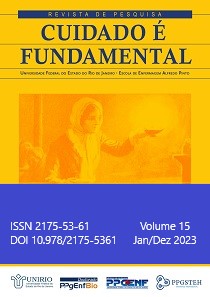Prevalencia y factores asociados al síndrome metabólico en el cuidado del anciano en la atención primaria de salud
DOI:
https://doi.org/10.9789/2175-5361.rpcfo.v15.12014Palabras clave:
Anciano;, Síndrome Metabólico;, Enfermería;, Atención Primaria de Salud.Resumen
Objetivo: evaluar la prevalencia del síndrome metabólico y su asociación con variables sociodemográficas, clínicas, antropométricas y de estilo de vida en ancianos atendidos en atención primaria. Método: estudio transversal realizado con 344 ancianos en una Unidad Básica de Salud del Distrito Federal. Se realizaron análisis del perfil lipídico, glucosa en ayunas y hemoglobina glucosilada. Se evaluaron datos sociodemográficos, hábitos de vida, presión arterial, antropometría y porcentaje de grasa. Se realizó regresión de Poisson para calcular la razón de prevalencia cruda y ajustada. Resultados: la prevalencia de síndrome metabólico fue del 62,2%. Hipertensión arterial (RPajustada=1,31; IC95%=1,02-1,67), aumento de cintura (RPajustada=1,46; IC95%=1,21-1,76), hipertrigliceridemia (RPajustada=1,98; IC95%=1,67-2,34) y la disminución de HDL (RPajustada= 1,19; IC del 95 % = 1,03-1,37) se asoció significativamente con el síndrome metabólico. Conclusión: la alta prevalencia del síndrome metabólico y su asociación con factores modificables apuntan a la necesidad de identificar y controlar precozmente los factores de riesgo en los ancianos.
Descargas
Citas
REFERÊNCIAS
Leite BC, Oliveira-Figueiredo DST, Rocha FL, Nogueira MF. Multimorbidity due to chronic noncommunicable diseases in older adults: a population-based study. Rev Bras Geriatr Gerontol. [Internet]. 2019 [cited 2022 jun 12];22(6). Available from: http://dx.doi.org/10.1590/1981-22562019022.190253
Barroso WKS, Rodrigues CIS, Bortolotto LA, Mota-Gomes MA, Brandão AA, Magalhães Feitosa AD, et al. Brazilian guidelines of hypertension - 2020. Arq Bras Cardiol. [Internet]. 2021 [cited 2022 jun 15];116(3):516–658. Available from: https://doi.org/10.36660/abc.20201238
Silva PAB, Sacramento AJ, Carmo CID, Silva LB, Silqueira SMF, Soares SM. Factors associated with metabolic syndrome in older adults: a population-based study. Rev Bras Enferm. [Internet]. 2019 [cited 2022 jun 12];72:221–8. Available from: http://dx.doi.org/10.1590/0034-7167-2018-0620
Lira Neto JCG, Silva TL, Silva IG, Félix NDC, Maranhão TA, Damasceno MMC. Frequência e fatores associados à dislipidemia entre pessoas com Diabetes Mellitus tipo 2. R Pesq Cuid Fundam [Internet]. 2022 [acesso em 25 de jul 2022];14:e11014. Disponível em: https://doi.org/10.9789/2175-5361.rpcfo.v14.11014
Ceolin J, Engroff P, Mattiello R, Schwanke CHA. Performance of anthropometric indicators in the prediction of metabolic syndrome in the elderly. Metabolic Syndrome and Related Disorders. [Internet]. 2019 [cited 2022 jun 15];17(4):232–9. Available from: http://dx.doi.org/10.1089/met.2018.0113
Neves CVB, Mambrini JVDM, Torres KCL, Teixeira-Carvalho A, Martins-Filho OA, Lima-Costa MF, et al. Association of metabolic syndrome with inflammatory markers in a sample of community-dwelling older adults. Reports in Public Health. [Internet]. 2019 [cited 2022 jun 16];35(3). Available from: http://dx.doi.org/10.1590/0102-311X00129918
Merchant RA, Chan YH, Lim JY, Emorley J. Prevalence of metabolic syndrome and association with grip strength in older adults: Findings from the hope study. Diabetes, Metabolic Syndrome and Obesity: Targets and Therapy. [Internet]. 2020 [cited 2022 jun 16];13:2677–86. Available from: https://doi.org/10.2147/DMSO.S260544
Li W, Song F, Wang X, Wang L, Wang D, Yin X, et al. Prevalence of metabolic syndrome among middle-aged and elderly adults in China: current status and temporal trends. Annals of Medicine. [Internet]. 2018 [cited 2022 jun 16];50(4):345–53. Available from: https://doi.org/10.1080/07853890.2018.1464202
Ge H, Yang Z, Li X, Liu D, Li Y, Pan Y, et al. The prevalence and associated factors of metabolic syndrome in Chinese aging population. Scientific Reports. [Internet]. 2020 [cited 2022 jun 16];10(1). Available from: https://doi.org/10.1038/s41598-020-77184-x
Silva-Júnior AC, Cruz DP, Souza Junior EV, Rosa RS, Moreira RM, Santos ICS. Repercussions of the prevalence of metabolic syndrome on adults and elderly people in the context of primary health care. Rev Salud Publica. [Internet]. 2018 [cited 2022 jun 16];20(6):742–7. Available from: https://doi.org/10.15446/rsap.v20n6.65564
Lira Neto JCG, Oliveira JFSF, Souza MA, Araújo MFM, Damasceno MMC, Freitas RWJF. Prevalence of the metabolic syndrome and its components in people with type 2 diabetes mellitus. Texto Contexto Enferm. [Internet]. 2018 [cited 2022 jun 15];27(3). Available from: http://dx.doi.org/10.1590/0104-070720180003900016
Sociedade Brasileira de Diabetes (SBD). Diretrizes da Sociedade Brasileira de Diabetes 2019-2020. [Internet]. 2019. [acesso em 16 de junho 2022]. Disponível em: https://diretriz.diabetes.org.br/
Lipschitz DA. Screening for nutritional status in the elderly. Primary Care. [Internet]. 1994 [cited 2022 jun 12];21(1). Available from: https://pubmed.ncbi.nlm.nih.gov/8197257/
Gallagher D, Heymsfield SB, Heo M, Jebb SA, Murgatroyd PR, Sakamoto Y. Healthy percentage body fat ranges: an approach for developing guidelines based on body mass index. Am J Clin Nutr [Internet]. 2000 [cited 2022 jun 29];72(3):694–701. Available from: https://doi.org/10.1093/ajcn/72.3.694
Oliveira LVA, Santos BNS, Machado ÍE, Malta DC, Velasquez-Melendez G, Felisbino-Mendes MS. Prevalence of the metabolic syndrome and its components in the Brazilian adult population. Cienc Saude Colet. [Internet]. 2020 [cited 2022 jun 17];25(11):4269–80. Available from: https://doi.org/10.1590/1981-22562018021.170154
Tavares DS, Gomes NC, Rodriguês LR, Tavares DMS. Profile of elderly persons with metabolic syndrome and factors associated with possible drug interactions. Rev Bras Geriatr Gerontol. [Internet]. 2018 [cited 2022 jun 18];21(2):164–75. Available from:
Ramires EKNM, Menezes RCE, Longo-Silva G, Santos TG, Marinho PM, Silveira JAC. Prevalence and factors associated with metabolic syndrome among brazilian adult population: National health survey – 2013. Arq Bras Card. [Internet]. 2018 [cited 2022 jun 20];110(5):455–66. Available from: https://doi.org/10.5935/abc.20180072
Moreira FP, Jansen K, Cardoso TDA, Mondin TC, Magalhães PV, Kapczinski F, et al. Metabolic syndrome and psychiatric disorders: a population-based study. Brazilian Journal of Psychiatry. [Internet]. 2019 [cited 2022 jun 20];41(1):38–43. Available from: http://dx.doi.org/10.1590/1516-4446-2017-2328
Regufe VMG, Pinto CMCB, Perez PMVHC. Metabolic syndrome in type 2 diabetic patients: a review of current evidence. Porto Biomedical Journal. [Internet]. 2020 [cited 2022 jun 20];5(6). Available from: http://dx.doi.org/10.1097/j.pbj.0000000000000101
Lee MK, Han K, Kim MK, Koh ES, Kim ES, Nam GE, et al. Changes in metabolic syndrome and its components and the risk of type 2 diabetes: a nationwide cohort study. Scientific Reports. [Internet]. 2020 [cited 2022 jun 20];10(1). Available from: https://doi.org/10.1038/s41598-020-59203-z
Costa MVG, Lima LR, Silva ICR, Rehem TCMSB, Funghetto SS, Stival MM. Risco cardiovascular aumentado e o papel da síndrome metabólica em idosos hipertensos. Escola Anna Nery. [Internet]. 2021 [acesso em 20 de junho 2022];25(1). Disponível em: http://dx.doi.org/10.1590/2177-9465-ean-2020-0055
Gouveia ÉR, Gouveia BR, Marques A, Peralta M, França C, Lima A, et al. Predictors of metabolic syndrome in adults and older adults from Amazonas, Brazil. International Journal of Environmental Research and Public Health. [Internet]. 2021 [cited 2022 jun 20];18(3):1–11. Available from: https://doi.org/10.3390/ijerph18031303
Subías-Perié J, Navarrete-Villanueva D, Fernández-García ÁI, Moradell A, Gesteiro E, Pérez-Gómez J, et al. Prevalence of metabolic syndrome and association with physical activity and frailty status in Spanish older adults with decreased functional capacity: a cross-sectional study. Nutrients. [Internet]. 2022 [cited 2022 jun 21];14(11):2302. Available from: https://doi.org/10.3390/nu14112302
Spitler KM, Davies BSJ. Aging and plasma triglyceride metabolism. Journal of Lipid Research. [Internet]. 2020 [cited 2022 jun 20];61(8):1161–7. Available from: https://doi.org/10.1194/jlr.R120000922
Fagundes LC, Fernandes MH, Brito TA, Coqueiro RS, Carneiro JAO. Prevalência e fatores associados à cintura hipertrigliceridêmica em idosos: um estudo de base populacional. Cienc Saude Colet. [Internet]. 2018 [acesso em 16 de junho 2022];23(2):607–16. Disponível em: https://doi.org/10.1590/1413-81232018232.02862016
Mussi RFF, Petróski EL. Metabolic syndrome and associated factors in quilombolas (Inhabitants of black communities) from Bahia, Brazil. Cienc Saude Colet. [Internet]. 2019 [cited 2022 jun 21];24(7):2481–90. Available from: https://doi.org/10.1590/1413-81232018247.13982017
Silva LO, Santos REA, Burgos MGPA. Metabolic syndrome in elderly type 2 diabetics treated at an outpatient clinic in a Brazilian capital. Scientia Medica. [Internet]. 2020 [cited 2022 jun 21];30(1). Available from: https://doi.org/10.15448/1980-6108.2020.1.36742
Félix NDC, Nóbrega MML. Metabolic syndrome: Conceptual analysis in the nursing context. Rev Lat Am Enfermagem. [Internet]. 2019 [cited 2022 jun 21];27. Available from: https://doi.org/10.1590/1518-8345.3008.3154
Publicado
Versiones
- 2023-06-29 (3)
- 2023-04-25 (2)
- 2023-04-14 (1)
Cómo citar
Número
Sección
Licencia
Derechos de autor 2023 Revista de Pesquisa Cuidado é Fundamental Online

Esta obra está bajo una licencia internacional Creative Commons Atribución-NoComercial-SinDerivadas 4.0.
TERMO DE TRANSFERÊNCIA DE DIREITOS AUTORAIS
Transfiro os direitos autorais deste artigo para a Revista de Pesquisa Cuidado é Fundamental - Online - RPCF, assim que ele for aceito para a devida publicação eletrônica. Os direitos de autor incluem o direito de reproduzir na íntegra ou em parte por qualquer meio, distribuir o referido artigo, incluindo figuras, fotografias, bem como as eventuais traduções. O autor pode ainda, imprimir e distribuir cópias do seu artigo, desde que mencione que os direitos pertencem a RPCF. Declaro que este manuscrito é original, não tendo sido submetido à publicação, na íntegra ou em partes para outros periódicos online ou não, assim cmmo em Anais de eventos científicos ou capítulos de livros.






























